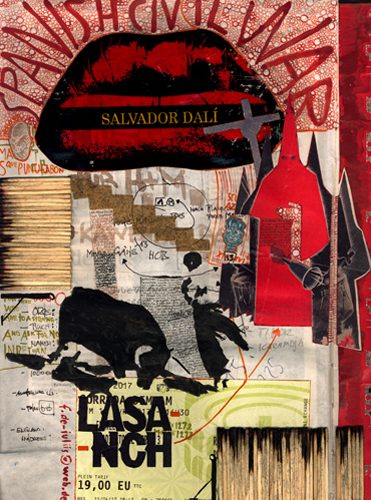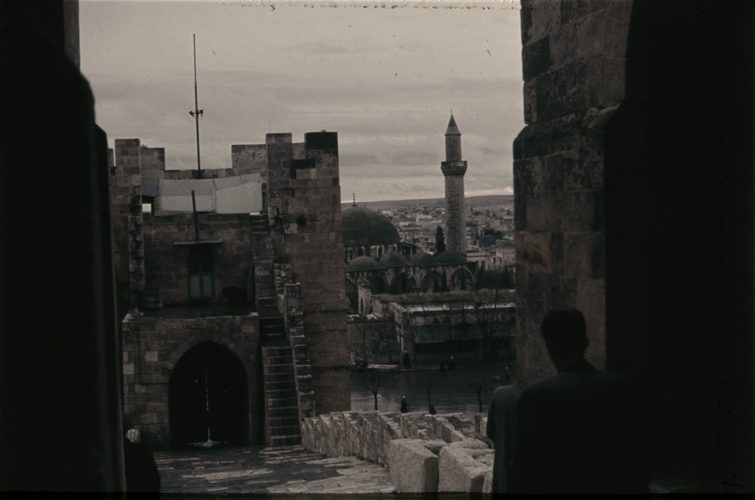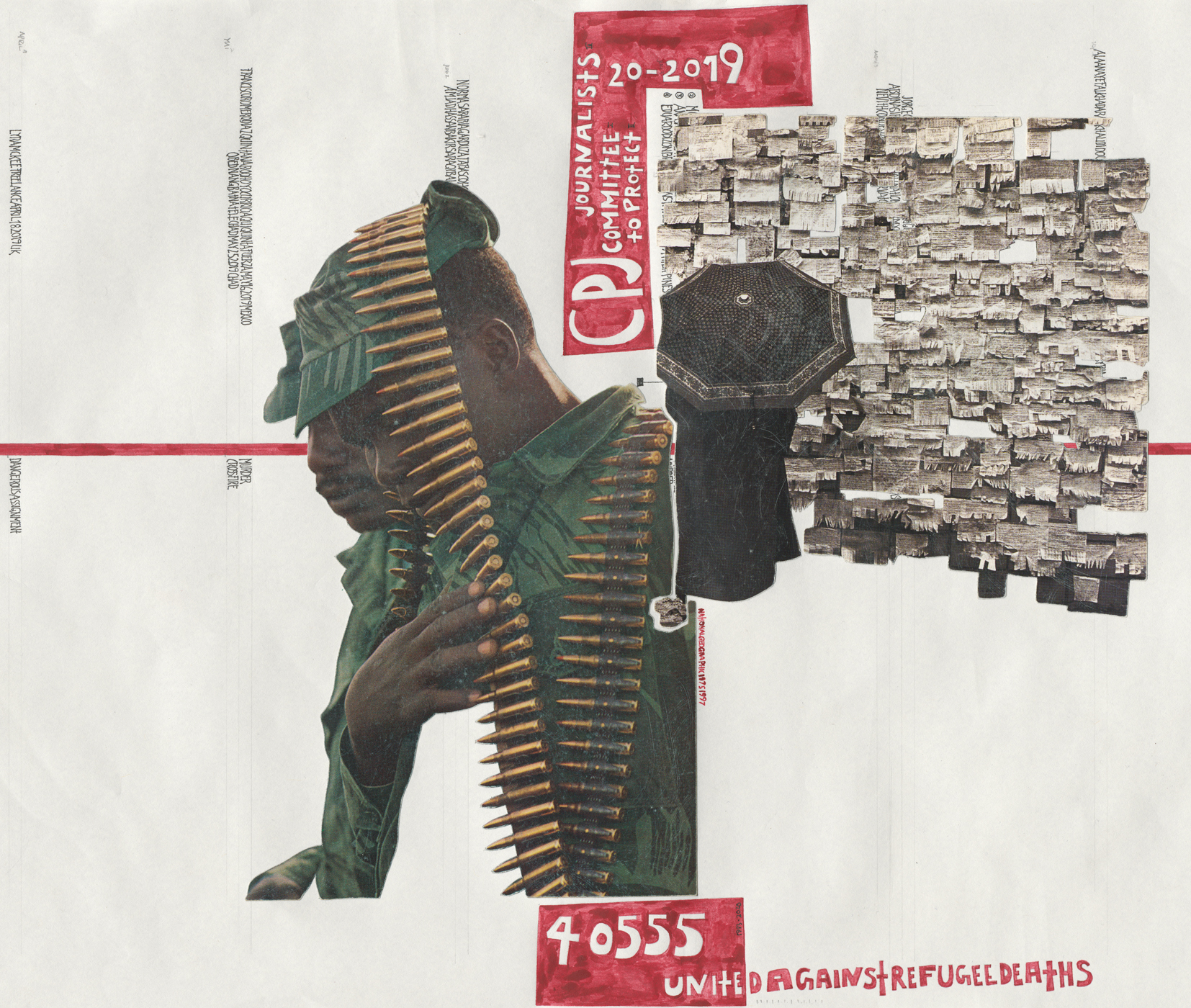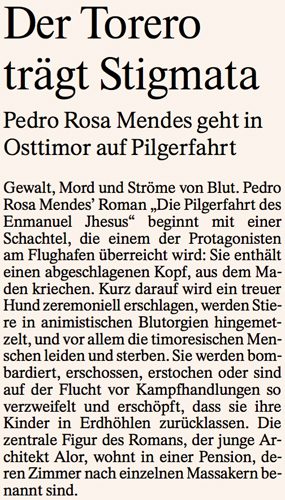
Pedro Rosa Mendes geht in Osttimor auf Pilgerfahrt
Gewalt, Mord und Ströme von Blut. Pedro Rosa Mendes’ Roman „Die Pilgerfahrt des Enmanuel Jhesus“ beginnt mit einer Schachtel, die einem der Protagonisten am Flughafen überreicht wird: Sie enthält einen abgeschlagenen Kopf, aus dem Maden kriechen. Kurz darauf wird ein treuer Hund zeremoniell erschlagen, werden Stiere in animistischen Blutorgien hingemetzelt, und vor allem die timoresischen Menschen leiden und sterben. Sie werden bombardiert, erschossen, erstochen oder sind auf der Flucht vor Kampfhandlungen so verzweifelt und erschöpft, dass sie ihre Kinder in Erdhöhlen zurücklassen. Die zentrale Figur des Romans, der junge Architekt Alor, wohnt in einer Pension, deren Zimmer nach einzelnen Massakern benannt sind… FAZ 06.07.17
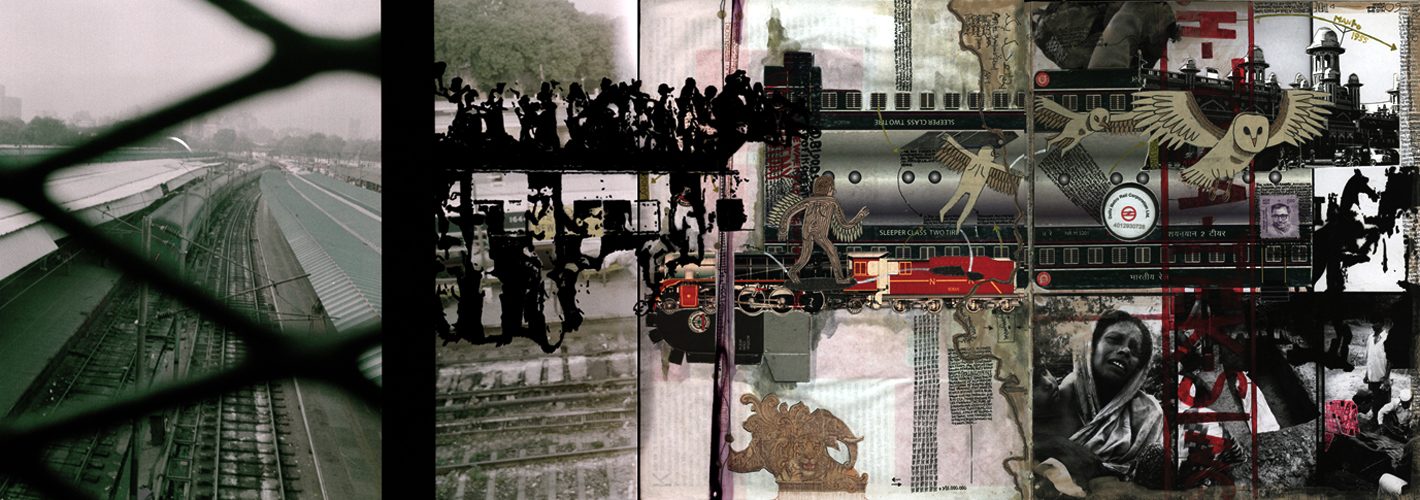
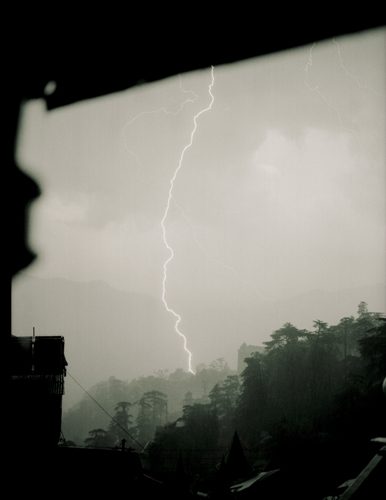
hier wurden 1947 die Details zur Teilung des Indischen Subkontinents vereinbart – Shimla/Indien
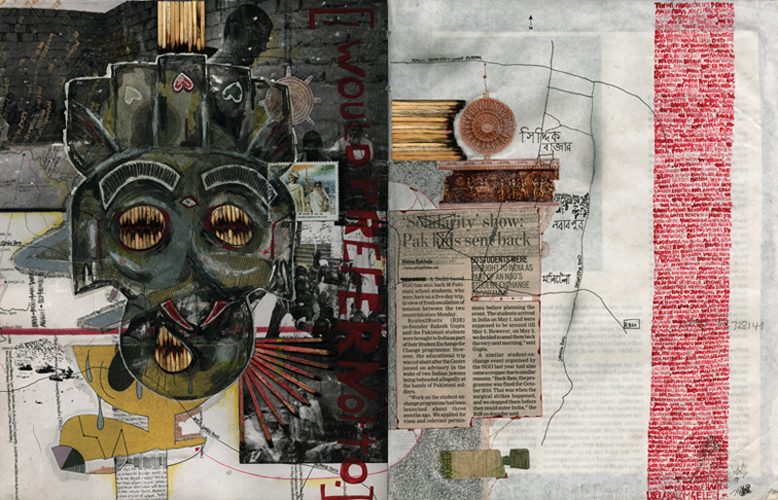
diary
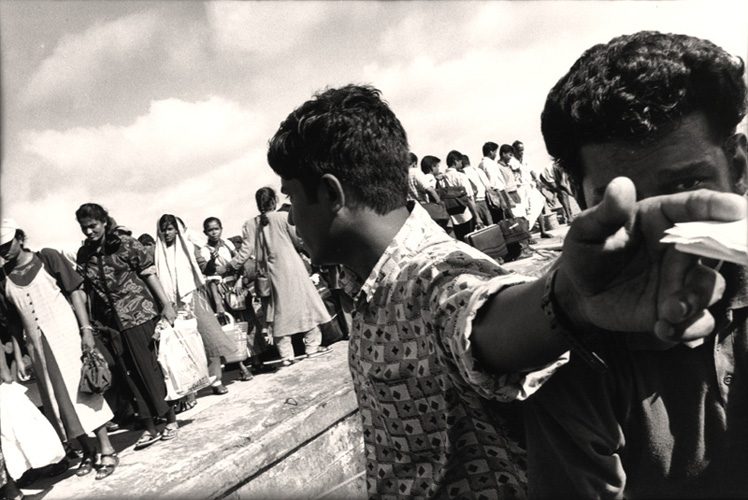
Vertreibungen bei Rangamati – Bangladesh
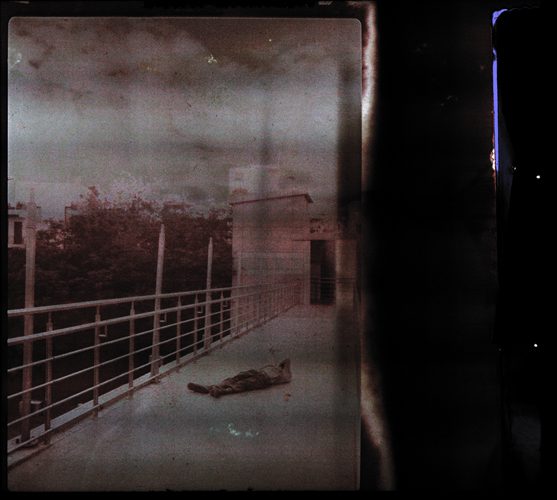
Delhi Expressway – Indien
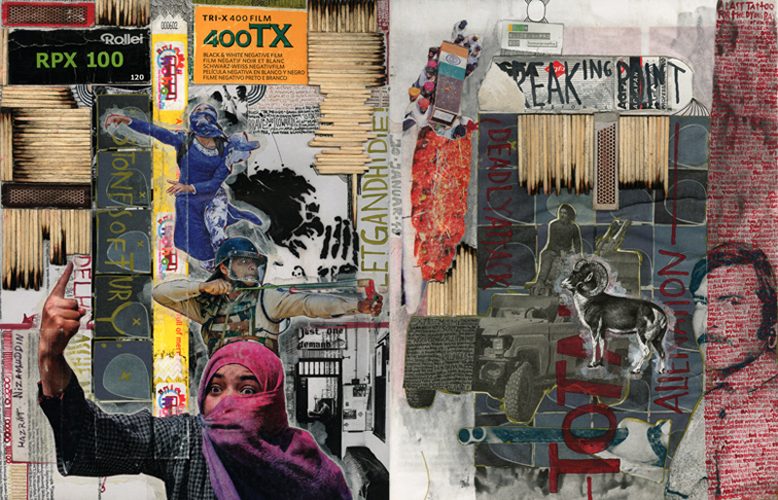
diary
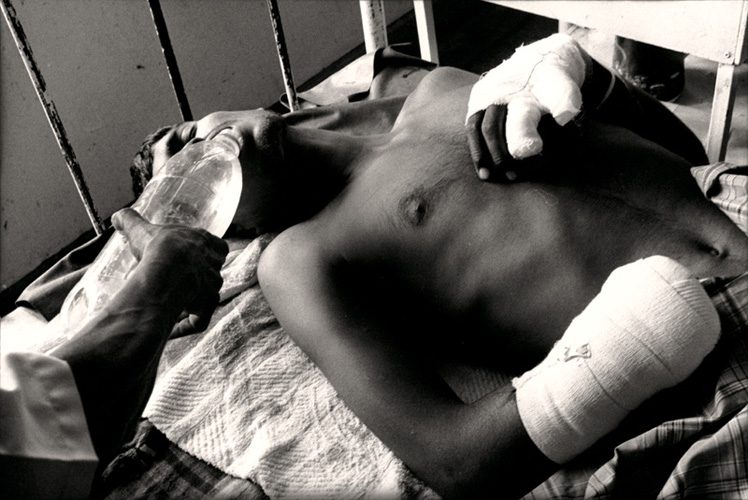
nach Aufständen in den Chittagong Hilltracts – Bangladesh
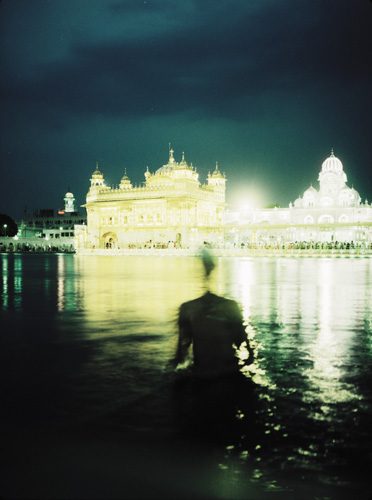
Golden Temple der Sikhs – Amristar/Indien
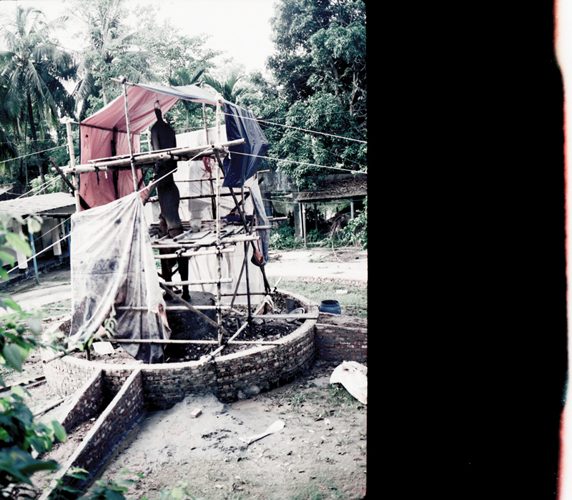
Gandhi Memorial – Noakali District/Bangladesh
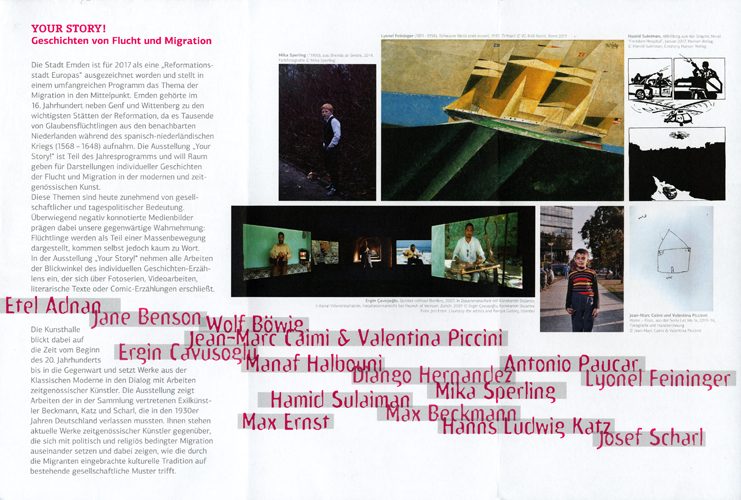
Your Story! Geschichten der Flucht und Migration vom 13. Mai bis 5. November 2017
Emden ist für 2017 als eine “Reformationsstadt Europas” ausgezeichnet worden und stellt in einem umfangreichen Programm das aktuelle Thema der Migration in den Mittelpunkt. Die Stadt gehörte im 16. Jahrhundert neben Genf und Wittenberg zu den wichtigsten Stätten der Reformation, da es Tausende von Glaubensflüchtlingen aus den benachbarten Niederlanden während des spanisch-niederländischen Kriegs (1568–1648) aufnahm. Die Ausstellung Your Story! will Raum geben für Darstellungen individueller Geschichten der Flucht und Migration in der modernen und zeitgenössischen Kunst.
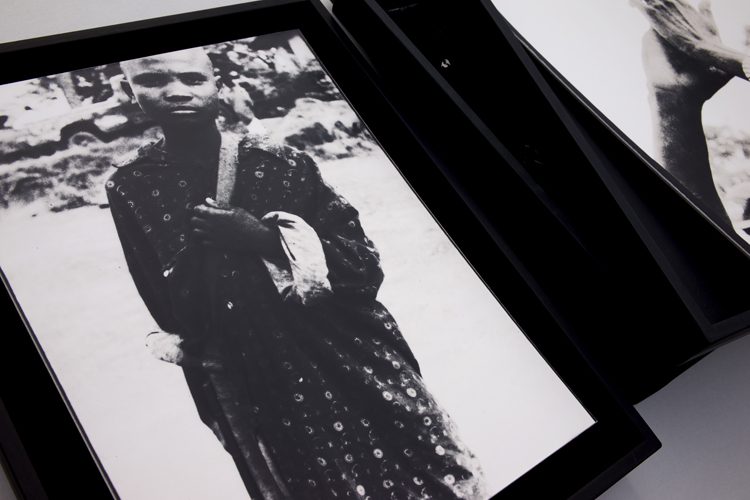
Bilder von Malick Sidibé …der Afrika-Fotograf.
Spiegel online einestages – 17.1.17
von Thilo Thielke
In den 60ern war Afrika im Aufbruch und voller Hoffnung. Malick Sidibé aus Mali fotografierte die Tanz- und Clubszene, stolze Musiker, Straßenschönheiten. Heute zeigen die besten Museen der Welt seine Bilder.
Er saß im schattigen Innenhof einer dieser staubigen Straßen von Bamako und trug das weiße Gewand, in dem er sich so wohl fühlte. Gegenüber kochte eine seiner vier Frauen, die hier alle friedlich nebeneinander wohnten, Fufu, den beliebten Brei mit Maniok und Kochbananen. Ein paar Hühner gackerten, die tropische Sonne brannte unbarmherzig.
Malick Sidibé hatte für den Gast aus Deutschland eine kleine Trophäensammlung aufgebaut: den Goldenen Löwen, den er 2007 auf der 52. Biennale in Venedig für sein Lebenswerk bekam; den Hasselblad-Fotografiepreis, einen World Press Photo Award. Daneben lehnte sein Gehstock.
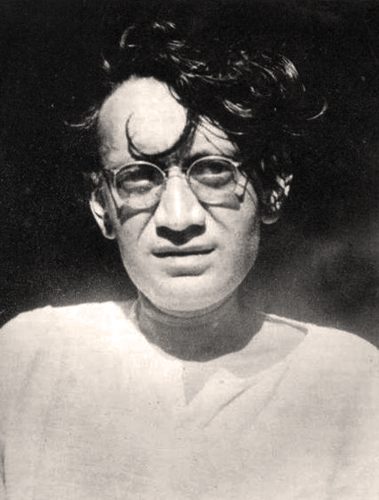
by Saadat Hasan Manto 1955 – translated from Urdu by Frances W. Pritchett
Two or three years after Partition, it occurred to the governments of Pakistan and Hindustan that like criminal offenders, lunatics too ought to be exchanged: that is, those Muslim lunatics who were in Hindustan’s insane asylums should be sent to Pakistan, and those Hindus and Sikhs who were in Pakistan’s insane asylums should be confided to the care of Hindustan.
There’s no telling whether this idea was wise or unwise; in any case, according to the decision of the learned, high-level conferences took place here and there, and finally a day was fixed for the exchange of lunatics. Thorough investigation was made. Those Muslim lunatics whose relatives were all in Hindustan were allowed to remain there. As for the rest, they were sent off to the border. Here in Pakistan, since almost all the Hindus and Sikhs had already left, the question of keeping anyone didn’t even arise. As many Hindu and Sikh lunatics as there were, all of them were conveyed, under police protection, to the border.
No telling what was going on that side. But here in the Lahore insane asylum, when word of this exchange arrived, major discussions began to take place. One Muslim lunatic, who every day for twelve years had regularly read the „Zamindar,“ was asked by a friend, „Molbi Sa’b, what’s this ‚Pakistan‘?“; after much thought and reflection he answered, „It’s a kind of place in Hindustan where razors are made.“
Having heard this answer, his friend was satisfied.
In the same way, a second Sikh lunatic asked another Sikh lunatic, „Sardarji, why are we being sent to Hindustan? –We don’t know the language of that place.“
The other smiled: „I know the language of those Hindustaggers– those Hindustanis go strutting around like the devil!“
One day, while bathing, a Muslim lunatic raised the cry of „Long live Pakistan!“ with such force that he slipped on the floor and fell, and knocked himself out.
There were also a number of lunatics who were not lunatics. The majority of them were murderers whose relatives had bribed the officers to get them sent to the lunatic asylum, to save them from the coils of the hangman’s noose. These understood something of why Hindustan had been partitioned and what Pakistan was. But they too were ignorant of the actual events. Nothing could be learned from the newspapers. The guards were illiterate and crude; nothing could be picked up from their conversation either. They knew only this much: that there’s a man, Muhammad Ali Jinnah, whom people call the „Qa’id-e Azam.“ He has made a separate country for the Muslims, the name of which is Pakistan. Where it is, what its location is– about this they new nothing. This is the reason that in the insane asylum, all the lunatics whose minds were not completely gone were trapped in the dilemma of whether they were in Pakistan or Hindustan. If they were in Hindustan, then where was Pakistan? If they were in Pakistan, then how could this be, since a while ago, while staying right here, they had been in Hindustan?
One lunatic became so caught up in the circle of Pakistan and Hindustan, and Hindustan and Pakistan, that he became even more lunatic. One day he had been sweeping– and then climbed a tree, seated himself on a branch, and gave an unbroken two-hour speech about the subtle problem of Pakistan and Hindustan. When the guards told him to come down, he climbed even higher. When he was warned and threatened, he said, „I don’t want to live in either Hindustan or Pakistan. I’ll live right here in this tree.“
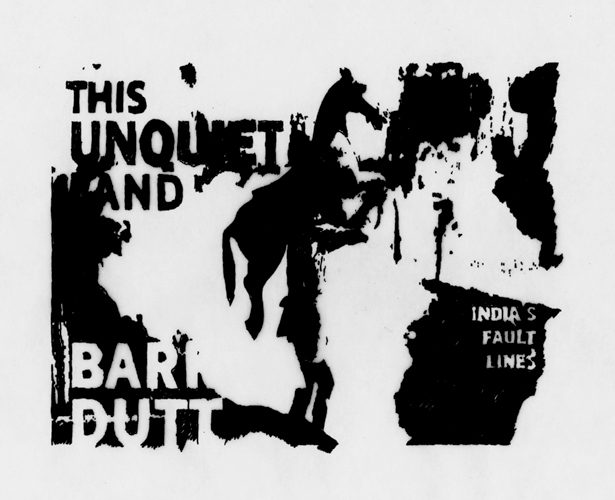
„In Indien fließt in diesen Tagen mehr Blut, als Regen fällt“
Robert Trumbull 1947 in der „New York Times“
Auf der Grand Trunk Road siebzig Jahre nach der Teilung des Indischen Subkontinents
Als der englische Unterhändler Radcliffe am 8. Juli 1947 in Delhi ankam und der Vizekönig ihm sagte, er müsse seine Grenzlinien bis zum 15. August ziehen, konnte der Jurist dies nicht glauben. Er fragte Nehru, da stellvertretender Präsident der Übergangsregierung und Jinnah, den Vorsitzenden der Muslimliga, ob dies denn ernst gemeint sei. Beide bejahten.
Was Nehru einen „tryst with destiny“, ein „Rendezvous mit dem Schicksal“, nannte, war durch Gewalt und die größte bekannte Migration in der Menschheitsgeschichte geprägt: mindestens fünfzehn Millionen Menschen wurden über Nacht zu Flüchtlingen.
„Stand out. Someone has to.“
Timothy Snyder, Professor of History, Yale University
Americans are no wiser than the Europeans who saw democracy yield to fascism, Nazism, or communism. Our one advantage is that we might learn from their experience. Now is a good time to do so. Here are twenty lessons from the twentieth century, adapted to the circumstances of today.
1. Do not obey in advance. Much of the power of authoritarianism is freely given. In times like these, individuals think ahead about what a more repressive government will want, and then start to do it without being asked. You’ve already done this, haven’t you? Stop. Anticipatory obedience teaches authorities what is possible and accelerates unfreedom.
2. Defend an institution. Follow the courts or the media, or a court or a newspaper. Do not speak of „our institutions“ unless you are making them yours by acting on their behalf. Institutions don’t protect themselves. They go down like dominoes unless each is defended from the beginning.
3. Recall professional ethics. When the leaders of state set a negative example, professional commitments to just practice become much more important. It is hard to break a rule-of-law state without lawyers, and it is hard to have show trials without judges.
4. When listening to politicians, distinguish certain words. Look out for the expansive use of „terrorism“ and „extremism.“ Be alive to the fatal notions of „exception“ and „emergency.“ Be angry about the treacherous use of patriotic vocabulary.
5. Be calm when the unthinkable arrives. When the terrorist attack comes, remember that all authoritarians at all times either await or plan such events in order to consolidate power. Think of the Reichstag fire. The sudden disaster that requires the end of the balance of power, the end of opposition parties, and so on, is the oldest trick in the Hitlerian book. Don’t fall for it.
6. Be kind to our language. Avoid pronouncing the phrases everyone else does. Think up your own way of speaking, even if only to convey that thing you think everyone is saying. (Don’t use the internet before bed. Charge your gadgets away from your bedroom, and read.) What to read? Perhaps „The Power of the Powerless“ by Václav Havel, 1984 by George Orwell, The Captive Mind by Czesław Milosz, The Rebel by Albert Camus, The Origins of Totalitarianism by Hannah Arendt, or Nothing is True and Everything is Possible by Peter Pomerantsev.
7. Stand out. Someone has to. It is easy, in words and deeds, to follow along. It can feel strange to do or say something different. But without that unease, there is no freedom. And the moment you set an example, the spell of the status quo is broken, and others will follow.
more …
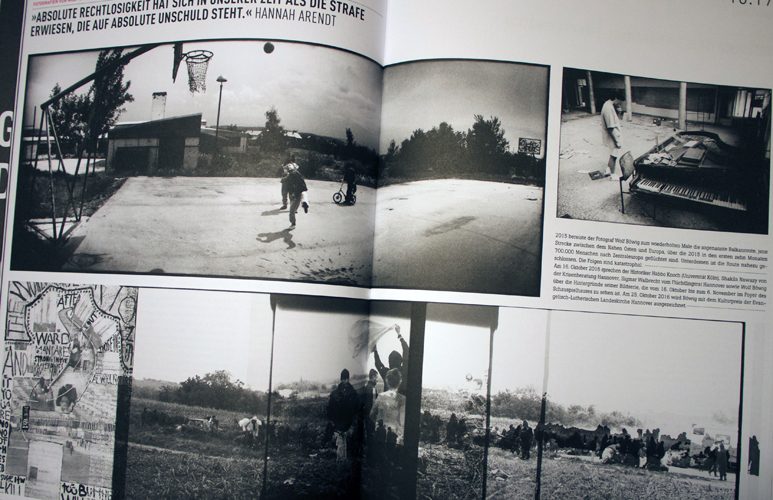
Heft#22 HASS – Schauspiel Hannover Oktober 2016
„Absolute Rechtlosigkeit hat sich in unsere Zeit als die Strafe erwiesen, die auf absolute Unschuld steht.“
Hannah Arendt | Über Flüchtlinge und Staatenlose
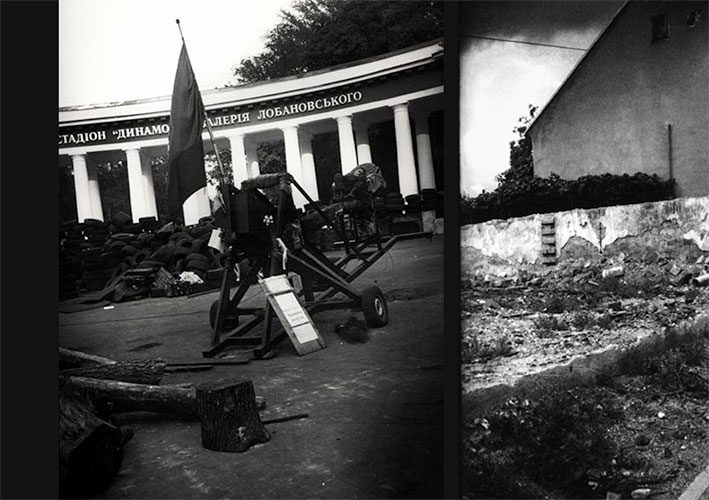
Oktober 2016 – Publikation borders and beyond
Fishing for stones: the photography of Wolf Böwig
by Pedro Rosa Mendes
A lot of what stands today as contemporary photojournalism is somehow saturated with «events» and «facts», as digital technology and social media conspire to make reality invisible to itself by its very ueber-exposure. The truth is, we reached the point where we see an overwhelming-lot more than what we are honestly able to understand. The paradox of contemporary journalism, in the fast-evolving global information ecosystem, is that broader visibility means narrower attention. Worse yet, the increasing democracy of tools is actually reinforcing single narratives. This is where the art and the ethics of documentary photography have a crucial contribution to give, as it is evident on the unique body of work of photographer Wolf Böwig.
